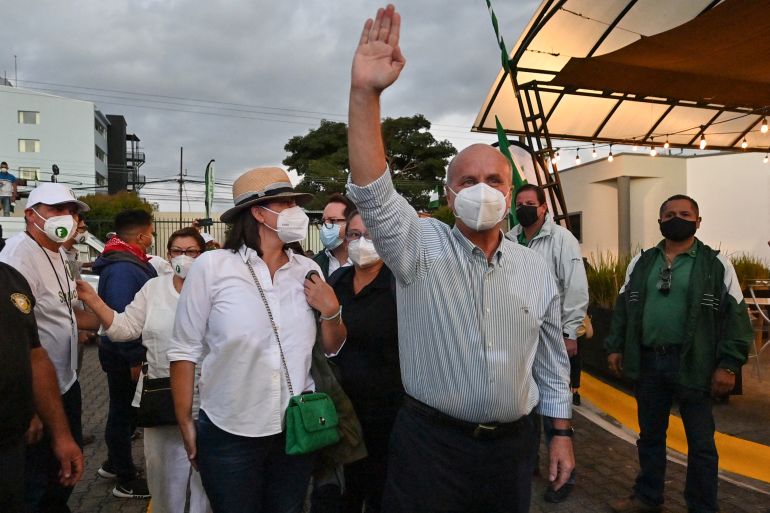Former President Figueres takes early lead in Costa Rica polls
A candidate needs to win 40 percent of the vote to avoid a runoff that has been scheduled for April 3.

Costa Rica’s former President Jose Maria Figueres has taken an early lead in the Latin American country’s national elections.
Figueres, who was president from 1990 to 1994, had 27 percent of the vote with 63 percent of ballots counted, the country’s Supreme Electoral Tribunal said hours after polls closed on Sunday.
Keep reading
list of 3 itemsCosta Rica allows same-sex marriages in first for Central America
Pandemic ‘far from controlled’ in the Americas: PAHO
Early results showed economist Rodrigo Chaves and conservative evangelical preacher Fabricio Alvarado Munoz battling for second place, with 16 and 15 percent of the vote respectively.
A candidate needs to win 40 percent of the vote to avoid a runoff that has been scheduled for April 3.
Costa Rica, with its green economy and booming tourism industry, has long been seen as a beacon of stability in the region, but polls have shown unemployment, corruption and creeping living costs are top concerns for 3.5 million eligible voters in the country of five million people.
Unemployment in Costa Rica has risen steadily for more than a decade, reaching 14.4 percent in 2021. The poverty rate was at 23 percent last year while the public debt was 70 percent of the gross domestic product (GDP).
Meanwhile, incumbent centre-left President Carlos Alvarado has faced unrest over proposals to increase taxes to offset deficits.
Voter Francisco Zeledon told the AFP news agency that “voting is the most important weapon we have to solve problems”.
“We have to solve poverty and create jobs for people,” the 35-year-old said.
In the capital, San Jose, Enrique Romero, a 52-year-old construction worker, said he would vote for Figueres.
“I want things to improve, that the government functions better,” Romero told The Associated Press news agency. “The situation is critical. It is not about going back to the past, but about moving forward and learning from experience.”
Under Costa Rican law, President Alvarado cannot seek a second consecutive term.
All 57 seats of the Legislative Assembly were also up for election on Sunday, however, a divided legislature is considered likely, with local media forecasting Figueres’s National Liberation Party (PLN) would win the most seats with 19, but fall well short of a majority.
PLN was founded by Figueres’s father, Jose Figueres Ferrer, who also served as the country’s president on three occasions in the 1940s, 50s and 70s.
The younger Figueres has been questioned over a $900,000 consulting fee he received after his presidency from the telecommunication company Alcatel while it competed for a contract with the national electricity company.
He was never charged with any crime and denied any wrongdoing.
Chaves is a former World Bank official who has forged an anti-establishment reputation while running the finance ministry under outgoing President Alvarado.
Chaves has contended with allegations he had been censured for sexual harassment earlier in his career. He has denied the claims on the campaign trail.
Meanwhile, Munoz, who was runner-up in Costa Rica’s 2018 presidential election, commands support from the evangelical community, which makes up about 20 percent of the country’s population.